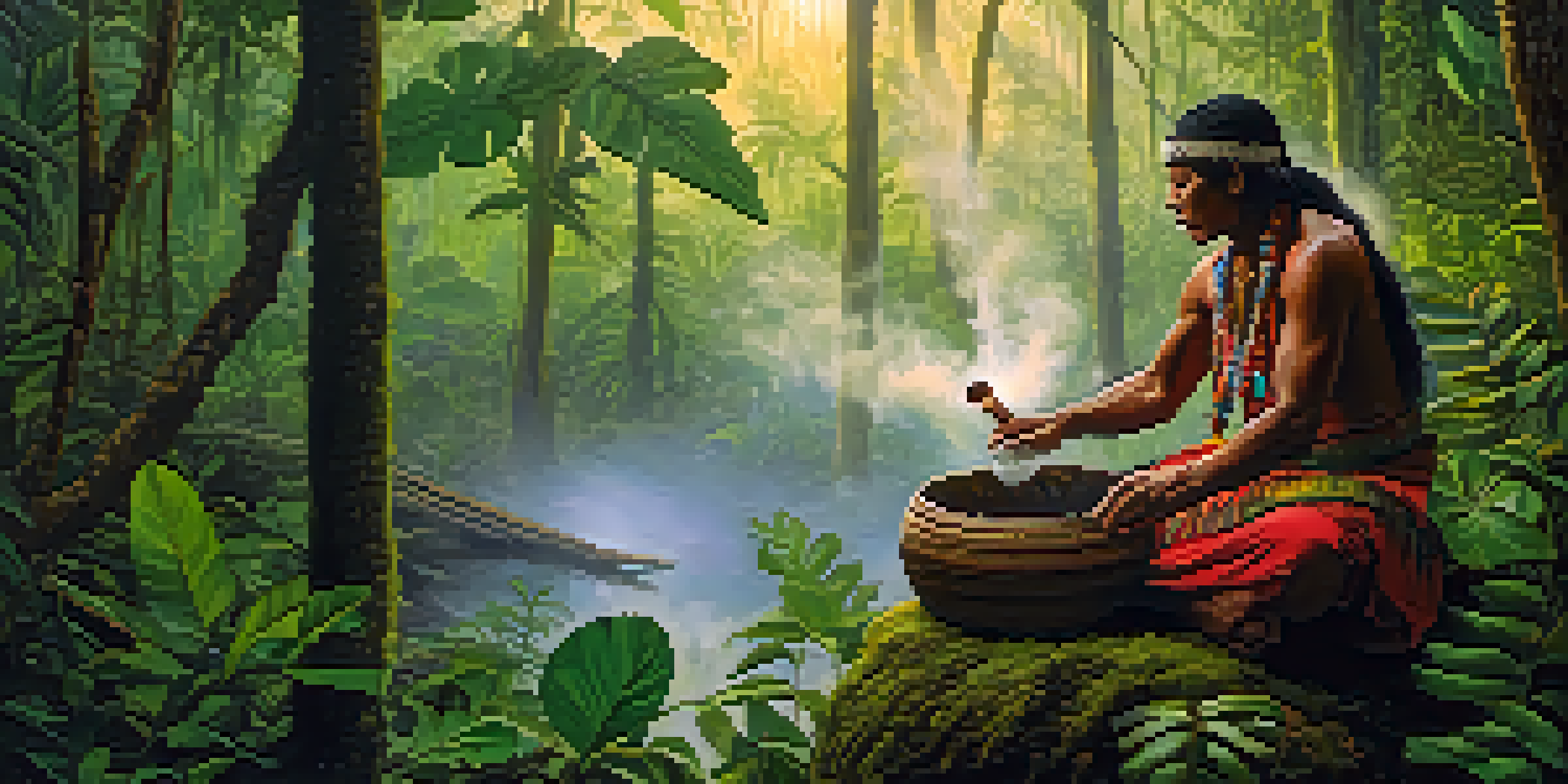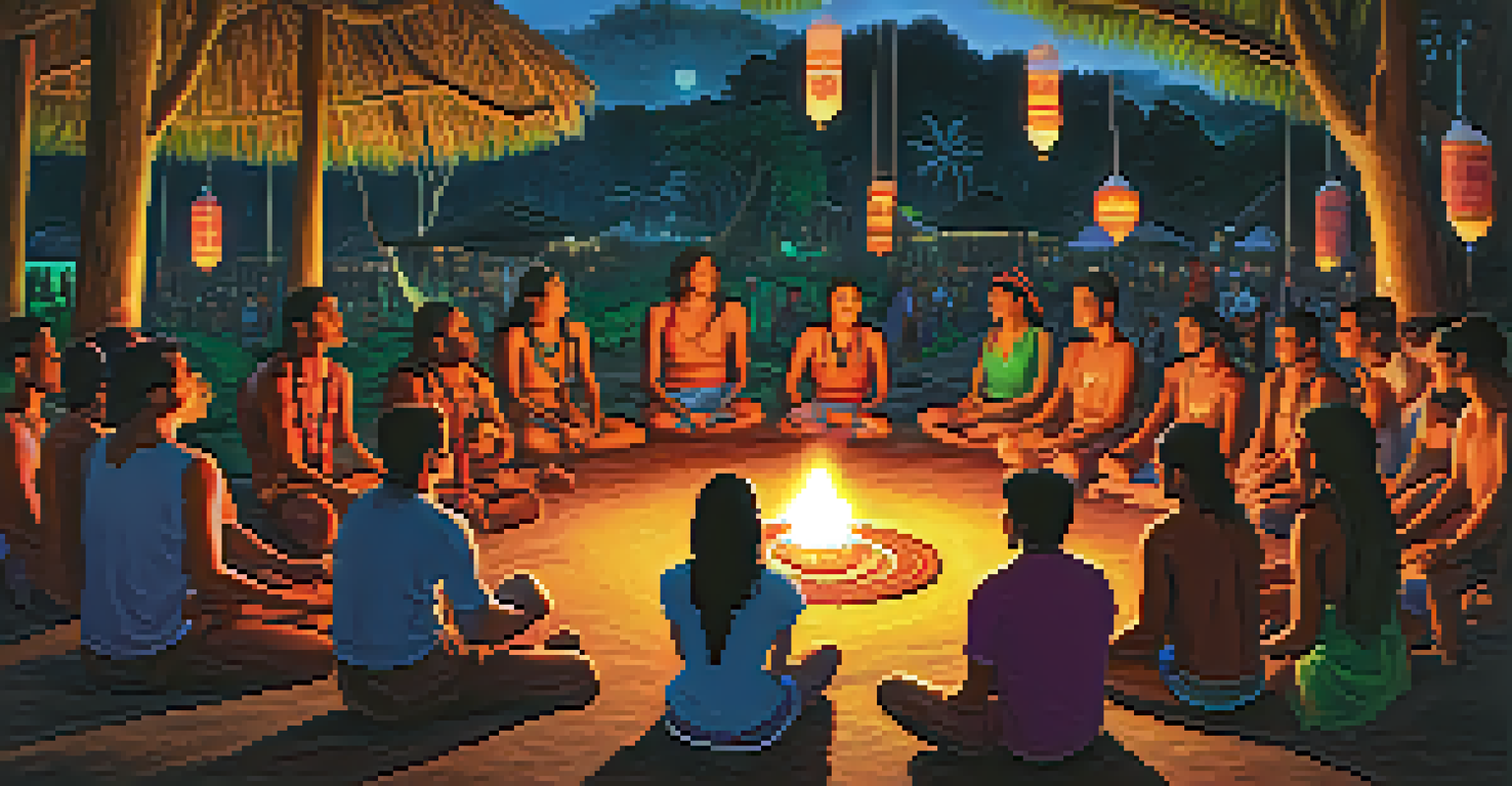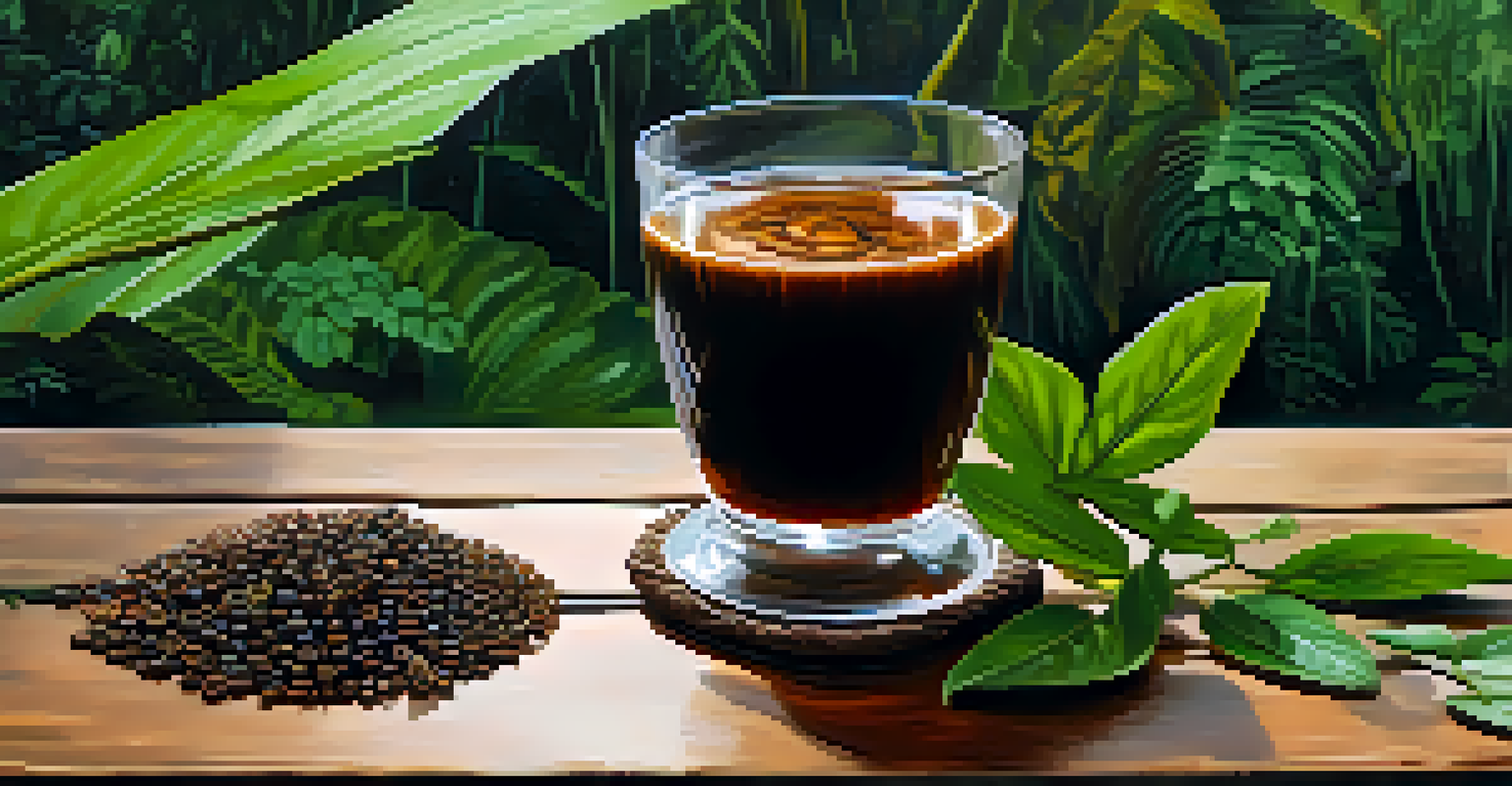Ayahuasca in Amazonian Tribes: A Healing Tradition

Understanding Ayahuasca and Its Cultural Importance
Ayahuasca, a sacred brew made from the Banisteriopsis caapi vine and other plants, holds significant cultural importance in Amazonian tribes. Traditionally, it’s used in spiritual ceremonies and healing rituals, providing a deep connection to nature and the universe. This ancient practice is not merely about the drink itself but encompasses a holistic approach to healing, community, and spirituality.
The plant is a teacher, and it shows you what you need to see, not what you want to see.
For many tribes, Ayahuasca is seen as a teacher, guiding individuals through introspection and promoting emotional healing. Participants often report experiencing visions that lead to profound insights about their lives, relationships, and personal struggles. The experience is deeply communal, bringing together individuals to share and support one another throughout the journey.
Understanding Ayahuasca's significance requires acknowledging the wisdom of the tribes that have preserved this tradition for centuries. Their rich cultural heritage informs the way Ayahuasca is used, highlighting the importance of respect and intention in each ceremony.
The Role of Shamans in Ayahuasca Ceremonies
In Ayahuasca ceremonies, shamans play a crucial role as spiritual leaders and guides. They are often considered the custodians of traditional knowledge and are responsible for administering the brew, ensuring a safe and transformative experience for participants. Their deep understanding of the plant medicine and its effects is vital for navigating the often intense emotional journeys that come with it.

Shamans utilize various rituals, songs, and chants, known as icaros, to create a safe space for healing. These songs are believed to invoke protective energies and facilitate spiritual connections, guiding participants through their experiences. The presence of a shaman helps to ground individuals, providing a sense of safety as they explore the depths of their consciousness.
Ayahuasca's Cultural Significance
Ayahuasca serves as a sacred tool for spiritual connection and healing within Amazonian tribes, emphasizing community and respect.
The relationship between participants and shamans is built on trust and respect. Many tribes believe that the shaman's intention and experience significantly shape the healing outcomes, making their role integral to the Ayahuasca experience.
The Healing Properties of Ayahuasca
Ayahuasca is renowned for its potential healing properties, particularly in addressing mental health issues such as depression, anxiety, and trauma. Many individuals describe their experiences with Ayahuasca as cathartic, often leading to emotional release and clarity. This healing process can help participants confront unresolved issues and gain new perspectives on their lives.
The plants are our allies, and they guide us in our healing journeys.
Scientific research supports some of these claims, showing that compounds in Ayahuasca may promote neurogenesis and enhance emotional well-being. The brew’s active ingredients, especially DMT (dimethyltryptamine), can create profound experiences that allow for deep self-reflection and healing. As a result, Ayahuasca has gained attention beyond the Amazon, attracting individuals seeking alternative therapies.
However, it’s essential to approach Ayahuasca with caution and respect. While many people have reported positive outcomes, experiences can vary greatly, and not everyone may find healing through this traditional practice.
Ayahuasca and Community Connection
For Amazonian tribes, Ayahuasca ceremonies serve as communal gatherings that strengthen social bonds and foster a sense of belonging. Participants come together not only to seek healing but also to support each other, sharing their stories and experiences. This communal aspect is vital, as it reinforces the idea that healing is not just an individual journey but a collective endeavor.
During these ceremonies, participants often engage in rituals that celebrate their cultural heritage and connection to the land. This shared experience can create a profound sense of unity, reminding individuals of their place within the community and the natural world. The warmth and support found in these gatherings can be incredibly healing in itself.
Shamans Guide Healing Journeys
Shamans play a vital role in Ayahuasca ceremonies, using their traditional knowledge to facilitate safe and transformative experiences.
In a world where many feel isolated, Ayahuasca ceremonies offer a space for connection and understanding. This sense of community can enhance the healing process, allowing individuals to feel seen, heard, and cared for.
The Global Interest in Ayahuasca
In recent years, there has been a growing global interest in Ayahuasca, attracting individuals from various backgrounds seeking spiritual and psychological healing. Retreat centers have emerged, offering guided experiences in the Amazon and other locations. While this increased attention can benefit local communities by promoting cultural exchange and economic opportunities, it also raises concerns about cultural appropriation and the commercialization of sacred traditions.
As more people embark on their Ayahuasca journeys, it’s crucial to approach these experiences with respect for the indigenous cultures that have preserved this practice. Understanding the context and significance of Ayahuasca in Amazonian tribes is essential to ensure that these traditions are honored rather than exploited.
Moreover, this global interest prompts important discussions about the ethics of sharing traditional knowledge and practices. A balanced approach that respects the origins of Ayahuasca while allowing for its exploration can lead to meaningful connections and mutual learning.
Challenges Facing Amazonian Tribes Today
Despite the growing interest in Ayahuasca, Amazonian tribes face numerous challenges, including deforestation, land rights issues, and the impacts of climate change. These threats not only jeopardize their traditional ways of life but also the plants that are crucial for their spiritual practices, including Ayahuasca. The loss of biodiversity in the Amazon could have dire consequences for the future of this sacred brew.
Moreover, as Ayahuasca becomes more popular, there is a risk that the cultural significance of the practice may be diluted or misrepresented. Many indigenous communities strive to protect their traditions while navigating the complexities of modern society. Balancing the preservation of their cultural identity with the pressure of globalization is a delicate challenge.
Global Interest and Ethical Concerns
The rising global interest in Ayahuasca brings both opportunities for cultural exchange and challenges related to appropriation and authenticity.
In response to these challenges, some tribes are actively engaging in advocacy and education to raise awareness about their rights and the importance of preserving the Amazon rainforest. By sharing their knowledge and experiences, they aim to foster a greater understanding of the interconnectedness of nature and culture.
The Future of Ayahuasca and Indigenous Healing Traditions
The future of Ayahuasca and its role in indigenous healing traditions is a subject of great importance and speculation. As global interest continues to rise, it presents both opportunities and challenges for Amazonian tribes. On one hand, increased visibility can lead to greater appreciation and respect for their cultural practices; on the other hand, it raises concerns about exploitation and loss of authenticity.
To navigate this complex landscape, collaboration between indigenous communities and those interested in Ayahuasca is essential. Mutual respect and understanding can help preserve the integrity of these traditions while allowing for meaningful exchange. This partnership can also empower tribes to advocate for their rights and protect their ancestral lands.

Ultimately, the future of Ayahuasca lies in the hands of those who honor its origins and the wisdom of the indigenous peoples who have safeguarded it for generations. By fostering a respectful dialogue and commitment to preservation, we can ensure that Ayahuasca remains a source of healing and connection for generations to come.